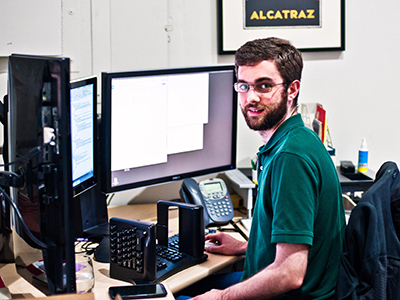Jesse

Software Engineering
I used to rarely bring up my disability; it was something I kept to myself. However, I’ve discovered that by being open about it, I gain an important opportunity to frame the conversation about my disability, as well as make specific connections with people. I think that making the right connections at the right time can be crucial for success.
I have dyslexia, which, as a child, not only impeded my ability to read, but made me often see and interact with information in a different way.
I went to Goshen College and received a bachelor of science degree in computer science. I interned at a variety of technical companies—for two summers I worked for Microsoft, and the summer after graduating college I interned at NASA, IBM, and 3Tier Group. These experiences taught me how to learn on the job, collaborate with others, take on new tools and technologies, and solve problems. In the field of computer science, learning and problem solving are two constants. In the tech field, there are always new technologies, new software, and new techniques, so being able to learn and grow on the job is an important skill to have.
Eventually I began working for an organization called Digital Foundry as a software developer. I am now the technical lead on software projects for outside clients. In my job, one of the communication skills I try to teach software engineers is how to explain the user experience to the client. Instead of using technical jargon, it’s better to show the clients something they are invested in. This fosters trust that we are looking out for them and their concerns and initiates a collaborative conversation about how to best meet their needs and goals. My disability helps me see the world and technology in a different way, and how I see the relationship between one thing and another is really helpful in my work.
Working with a broad range of software projects and leading a team of software engineers allows me to enjoy different tasks and focus on different skills. I really enjoy my current career trajectory, and I plan to continue where I am for the time being. I try to teach others what I have learned: that it’s my responsibility to do what’s needed to be in control of my own success.